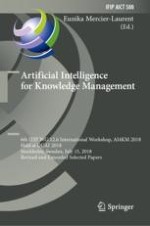2020 | Buch
Artificial Intelligence for Knowledge Management
6th IFIP WG 12.6 International Workshop, AI4KM 2018, Held at IJCAI 2018, Stockholm, Sweden, July 15, 2018, Revised and Extended Selected Papers
herausgegeben von: Eunika Mercier-Laurent
Verlag: Springer International Publishing
Buchreihe : IFIP Advances in Information and Communication Technology
